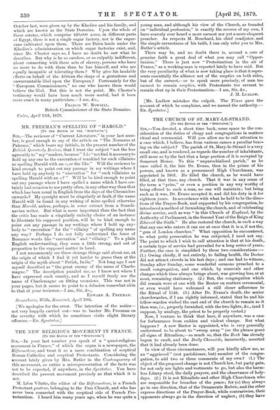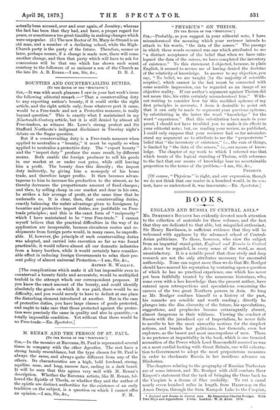THE CHURCH OF ST. MARY-LE-STRAND. (TO THE EDITOR OF THE
" SPECTATOR.") SIR,—Yon devoted, a short time back, some space to the con- sideration of the duties of clergy and congregations in matters ritual and ceremonial. Will you allow me to call attention to a case which, I believe, has from various causes a peculiar bear- ing on the subject? The parish of St. Mary-le-Strand is a very small one, and is rendered, as regards the number of inhabitants, still more so by the fact that a large portion of it is occupied by Somerset House. To this " unparochialised parish," as he once called it, the late Dr. Evans, then in the prime of his powers, and known as a pronounced High Churchman, was appointed in 1861. He filled the church, as he would have filled, at that time, any church. That it was in any sense of the term a "prize," or even a position in any way worthy of being offered to such a man, no one will maintain; but being such as it was, Dr. Evans accepted it, and did his duty in it for eighteen years. In accordance with what he held to be the direc- tions of the Prayer-Book, and supported by his congregation, he introduced a method of furnishing the church, and of celebrating divine service, such as was " in this Church of England, by the Authority of Parliament, in the Second Year of the Reign of King Edward the Sixth." He also restored the church, in such a way that any one who enters it can see at once that it is a, if not the, "gem of London churches." What opposition he encountered, to what petty persecution he was subjected, I need not say. The point to which I wish to call attention is that at his death,. a certain type of service had prevailed for u long series of years.. Further, the case is simplified by these two considerations :- (1.) Owing chiefly, if not entirely, to failing health, the Doctor did not attract crowds in his last days ; and one had to witness,. Sunday after Sunday, some wonderful sermons preached to a small congregation, and one which, by removals and other changes which time always brings about, was growing less, or at most, remaining stationary. (2.) But, the congregation which did remain were at one with the Rector on matters ceremonial,. or even would have welcomed a still closer adherence to the Ritual of 1548. (3.) After Dr. Evans's death, the senior churchwarden, if I am rightly informed, stated that he and his fellow-warden wished the east end of the church to remain as it then was, i.e., properly furnished, with the two lights,. &c.,.(and I suppose, by analogy, the priest to be properly vested.)
Now, I venture to think that here, if anywhere, was a case
for forbearance from sudden and violent change. But what happens ? A new Rector is appointed, who is very generally understood to be about to "sweep away" (so the phrase goes) all signs, of Ritualism,—so much so, that the Rock has already begun to exult, and the Daily Chronicle, incorrectly, asserted that it had already been done.
In view of these circumstances, will you kindly allow me, as
an " aggrieved" (not parishioner, but) member of the congre- gation, to add two or three comments of my own ? (1.) The object of the proposed change is not Church law, but party gain, for not only are lights and vestments to go, but also the harm- less Litany stool, the daily prayers, and the observance of holy- days. (2.) It is not Ritualists and other High Churchmen who are responsible for breaches of the peace; for (a) they always go in one direction, that of the Ornaments Rubric, and the other express directions of the Prayer-Book, while contrariwise, their opponents always go in the direction of neglect; (b) they have
actually been accused, over and over again, of Jesuitry; whereas the fact has been that they had, and have, a proper regard for peace, or sometimes a too great timidity in making changes which were unpopular. (3.) The new Rector of St. Mary-le-Strand is an old man, and a member of a declining school, while the High- Church party is the party of the future. Therefore, sooner or later, perhaps sooner, if a change is made now, there will come another change, and then that party which will have to ask for concessions will be that one which has shown such scant courtesy to the followers of so eminent a son of the Church as the late Dr. A. B. Evans.—I am, Sir, &c., D. B. J.



































 Previous page
Previous page